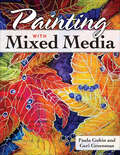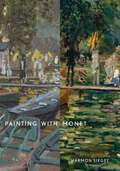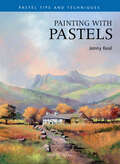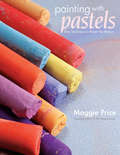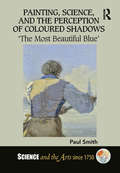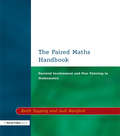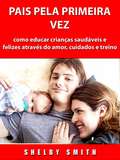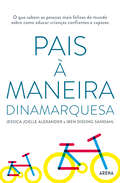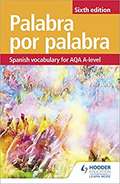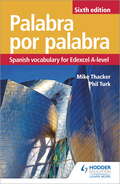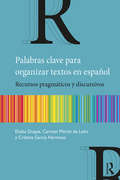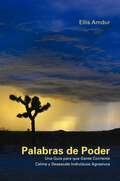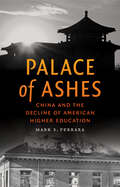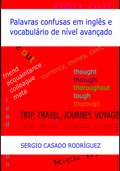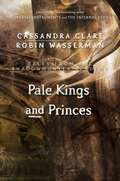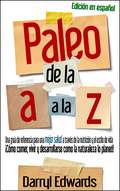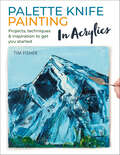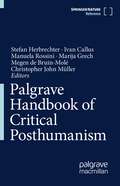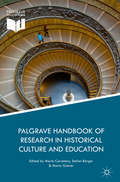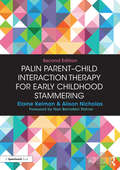- Table View
- List View
Painting with Mixed Media
by Paula Guhin Geri GreemanA gorgeously illustrated guide to exploring the creative possibilities of multiple materials in your arts and crafts. Learn how to use painting mediums such as acrylic, watercolor, oil paint, ink, tempera, and pastels in combination with glazes, gesso, wax, and other materials for use in collages, scrapbooks, memory boxes, photo albums, and individual art pieces. For beginners to mixed-media painting as well as those who seek to expand their knowledge and skills with new ideas, techniques, or combinations, this guide opens up new creative paths and possibilities. Each chapter features a different painting medium, exploring the ways it can be combined with other materials, and ends with spin-off suggestions that challenge you to continue exploring. Also included are a gallery of inspiring artwork from eight mixed-media artists and a list of resources for art materials.
Painting with Monet
by Harmon SiegelA major reassessment of the methods and meaning of impressionismAt pivotal moments in his career, Claude Monet would go out with a fellow artist, plant his easel beside his friend&’s, and paint the same scene. Painting with Monet closely examines pairs of such works, showing how attention to this practice raises tantalizing new questions about Monet&’s art and about impressionism as a movement.Is impressionist painting an objective attempt to capture reality as it really is? Or is it a subjective expression of the artist&’s unique way of perceiving things? How can artists create a movement without conformity extinguishing individuality? Harmon Siegel reveals how Monet explored problems like these in concrete, practical ways while painting alongside his teachers, Eugène Boudin and Johan Barthold Jongkind; his friends, Frédéric Bazille and Pierre-Auguste Renoir; and his hero, Édouard Manet. At a time of major cultural upheavals, these artists asked how we can know reality beyond our personal perception. Siegel provides new insights into the aesthetic, philosophical, and ethical stakes for these painters as they responded to a rapidly changing society.Beautifully illustrated, Painting with Monet sheds critical light on how Monet and his fellow impressionists, painting side by side, professed their capacity to know the world and affirmed their belief in what Siegel calls the reality of others.
Painting with Pastels
by Jenny KealJenny Keal shares her passion for soft pastels in this inspiring and practical guide. She takes us through the basics of painting such as composition, colour theory and composition. There are then five beautiful step-by-by step demonstrations showing how to paint landscapes and flower studies, with plenty of useful tips for anyone wishing to paint with pastels, this most 'expressive and immediate' of mediums.
Painting with Pastels: Easy Techniques to Master the Medium
by Maggie PriceCome enjoy the art of pastel painting with beloved workshop instructor Maggie Price. In this step-by-step guide, she teaches you everything you need to know to make the most of this accessible art form. From selecting the right materials to learning the fundamentals of composition, Maggie starts with the basics and progresses to 21 complete pastel demonstrations that detail specific painting techniques and effects. You'll learn how to: Create depth and movement with color Paint using a range of strokes Blend colors to create luminous skies, reflections and more Underpaint to achieve brilliant light and deep shadows Mix pastels with watercolor and gouache to create fluid effects Create new compositions from photographs In addition to step-by-step guidance, you'll be inspired by the work of ten nationally renowned pastel artists. Their contributions to this book illustrate the limitless possibilities of pastel painting and offer additional insight for working with this versatile medium. Maggie also includes dozens of helpful sidebars to help you save time, avoid mistakes and work more efficiently. With its blend of visual instruction, thorough guidance and breathtaking artwork, this is the only guide you need to experience the joy and satisfaction of painting with pastels.
Painting, Science, and the Perception of Coloured Shadows: ‘The Most Beautiful Blue’ (Science and the Arts since 1750)
by Paul SmithMany artists and scientists – including Buffon, Goethe, and Philipp Otto Runge – who observed the vividly coloured shadows that appear outdoors around dawn and dusk, or indoors when a candle burns under waning daylight, chose to describe their colours as ‘beautiful’. Paul Smith explains what makes these ephemeral effects worthy of such appreciation – or how depictions of coloured shadows have genuine aesthetic and epistemological significance. This multidisciplinary book synthesises methodologies drawn from art history (close pictorial analysis), psychology and neuroscience (theories of colour constancy), history of science (the changing paradigms used to explain coloured shadows), and philosophy (theories of perception and aesthetic value drawn from Wittgenstein and Merleau-Ponty). This title will be of interest to scholars in art history, art theory, and the history of science and technology.
Painting, Science, and the Perception of Coloured Shadows: ‘The Most Beautiful Blue’ (Science and the Arts since 1750)
by Paul SmithMany artists and scientists – including Buffon, Goethe, and Philipp Otto Runge – who observed the vividly coloured shadows that appear outdoors around dawn and dusk, or indoors when a candle burns under waning daylight, chose to describe their colours as ‘beautiful’. Paul Smith explains what makes these ephemeral effects worthy of such appreciation – or how depictions of coloured shadows have genuine aesthetic and epistemological significance. This multidisciplinary book synthesises methodologies drawn from art history (close pictorial analysis), psychology and neuroscience (theories of colour constancy), history of science (the changing paradigms used to explain coloured shadows), and philosophy (theories of perception and aesthetic value drawn from Wittgenstein and Merleau-Ponty). This title will be of interest to scholars in art history, art theory, and the history of science and technology.
Paired Maths Handbook: Parental Involvement and Peer Tutoring in Mathematics
by Keith J. Topping Judi BamfordFirst Published in 1998. Routledge is an imprint of Taylor & Francis, an informa company.
Pais Pela Primeira Vez: como educar crianças saudáveis e felizes através do amor, cuidados e treino
by Hiddenstuff EntertainmentSe você é vai ser pela primeira vez ou espera seu bebé recém-nascido, então este guia é para si! Os bebês são frágeis e precisam de muito cuidado. No entanto, cuidar de um bebê recém-nascido será uma das coisas mais desafiadoras que você já fez! Certifique-se de estar preparado - Como cuidar do seu recém-nascido. - O que comprar. - O que alimentar. - Como criar seu filho. Muitas outras informações úteis para novos pais.
Pais à maneira dinamarquesa
by Jessica Alexander Iben Dissing SandahlO que sabem as pessoas mais felizes do mundo sobre como educar crianças confiantes e capazes O que faz da Dinamarca o país mais feliz do mundo? E quais são os segredos dos pais dinamarqueses para criarem crianças bem-sucedidas, confiantes e felizes? Este guia optimista e prático reúne as ideias de uma psicoterapeuta e de uma mãe - uma dinamarquesa e uma americana casada com um dinamarquês, respectivamente - sobre os hábitos das famílias mais felizes na Terra. O livro oferece conselhos sobre como: - Incentivar jogos livres - Potenciar a autenticidade e a confiança - Fomentar a empatia - Enfatizar o trabalho em equipa sobre as lutas de poder - Comemorar a união Com tópicos práticos e exemplos inspiradores, Pais à Maneira Dinamarquesa ajudará os pais e educadores a tornar as crianças mais felizes e mais bem integradas. «Um poderoso novo método de educar crianças "resilientes e seguras em termos emocionais" - por outras palavras, exactamente aquilo que todos procuramos.»Revista Mother «Se os "adultos" de todos os países pusessem em prática os princípios delineados em A Maneira Dinamarquesa nem que fosse em 50 por cento das suas vidas, oh, o potencial para mudar a humanidade [...] Por vezes um livro tem o poder de remodelar literalmente o mundo tal como o conhecemos, provocando mudanças na próxima geração que poderão até fazer com que a palavra guerra se torne um conceito do passado difuso e distante. Pais à Maneira Dinamarquesa é, verdadeiramente, uma Bíblia para todos os adultos."The Glass House Girls «A cozinha nórdica, o design nórdico, o noir nórdico - a lista de exportações culturais de sucesso tem sido interminável, ao longo da última década, e agora podemos acrescentar-lhe a Educação Nórdica [...] Dir-se-ia que as mães dinamarquesas é que têm razão.»The Post (Copenhaga) «A pesquisa e a honesta reflexão de Alexander sobre como a sua própria prática parental tem sido influenciada e melhorada pela cultura dinamarquesa do marido, é um valioso recurso para quaisquer pais que procurem reflectir a respeito das vulnerabilidades no seu próprio estilo de parentalidade. A pesquisa de Sandahl, e a sua experiência pessoal e profissional como mãe dinamarquesa e psicoterapeuta, reforçam a ideia de que os dinamarqueses têm, de facto, um brilhante talento natural para criar miúdos resilientes e equilibrados. Juntas, as autoras criam um guia parental escrito com ponderação, encorajando a auto-reflexão e oferecendo conselhos úteis sobre como melhor abordar os mais comuns desafios da parentalidade. Pais à Maneira Dinamarquesa é de leitura obrigatória para os pais originários de qualquer cultura.Carolyn Rathjen, MSW, LICSW
Pais à maneira dinamarquesa
by Jessica Joelle Alexander Iben Dissing SandahlO que sabem as pessoas mais felizes do mundo sobre como educar crianças confiantes e capazes O que faz da Dinamarca o país mais feliz do mundo? E quais são os segredos dos pais dinamarqueses para criarem crianças bem-sucedidas, confiantes e felizes? Este guia optimista e prático reúne as ideias de uma psicoterapeuta e de uma mãe - uma dinamarquesa e uma americana casada com um dinamarquês, respectivamente - sobre os hábitos das famílias mais felizes na Terra. O livro oferece conselhos sobre como:- Incentivar jogos livres- Potenciar a autenticidade e a confiança- Fomentar a empatia- Enfatizar o trabalho em equipa sobre as lutas de poder- Comemorar a união Com tópicos práticos e exemplos inspiradores, Pais à maneira dinamarquesa ajudará os pais e educadores a tornar as crianças mais felizes e mais bem integradas. Sobre Pais à maneira dinamarquesa:«Um poderoso novo método de educar crianças [...] 'resilientes e seguras em termos emocionais' - por outras palavras, exactamente aquilo que todos procuramos.»Revista Mother «Pais à maneira dinamarquesa é, verdadeiramente, uma Bíblia para todos os adultos.»The Glass House Girls «Se os 'adultos' de todos os países pusessem em prática os princípios delineados em Pais à maneira dinamarquesa, nem que fosse em 50% das suas vidas, oh, o potencial para mudar a Humanidade [...]. Por vezes, um livro tem o poder de remodelar literalmente o mundo tal como o conhecemos, provocando mudanças nas gerações seguintes, que poderão até fazer com que a palavra guerra se torne um conceito do passado difuso e distante.»The Glass House Girls «A cozinha nórdica, o design nórdico, o noir nórdico - a lista de exportações culturais de sucesso tem sido interminável, ao longo da última década, e podemos agora acrescentar-lhe a Educação Nórdica [...] Dir-se-ia que as mães dinamarquesas é que têm razão.»The Post (Copenhaga) «A pesquisa e a honesta reflexão de Alexander sobre como a sua própria prática parental tem sido influenciada e melhorada pela cultura dinamarquesa do marido são valiosos recursos para quaisquer pais que procurem reflectir a respeito das vulnerabilidades do seu próprio estilo de parentalidade. A pesquisa de Sandahl e a sua experiência pessoal e profissional como mãe dinamarquesa e psicoterapeuta reforçam a ideia de que os dinamarqueses têm, de facto, um brilhante talento natural para criar miúdos resilientes e equilibrados. Juntas, as autoras criam um guia parental escrito com ponderação, encorajando a auto-reflexão e oferecendo conselhos úteis sobre como melhor abordar os mais comuns desafios da parentalidade. Pais à maneira dinamarquesa é de leitura obrigatória para os pais originários de qualquer cultura.»Carolyn Rathjen, MSW, LICSW
Palabra por Palabra Sixth Edition: Spanish Vocabulary For Aqa A-level
by Phil Turk Mike ThackerEssential vocabulary for AQA A-level Spanish, all in one place.- Supplement key resources such as course textbooks with all the vocab students need to know in one easy-to-navigate place, completed updated to match the latest specification - Ensure extensive vocab coverage with topic-by-topic lists of key words and phrases, including a new section dedicated to film and literature - Test students' knowledge with end-of-topic activities designed to deepen their understanding of word patterns and relationships - Develop effective strategies for learning new vocab and dealing with unfamiliar words
Palabra por Palabra Sixth Edition: Spanish Vocabulary For Edexcel
by Phil Turk Mike ThackerExam board: EdexcelLevel: A-levelSubject: SpanishFirst teaching: September 2017First exams: Summer 2018Essential vocabulary for Edexcel A level Spanish, all in one place.- Supplement key resources such as course textbooks with all the vocab students need to know in one easy-to-navigate place, completed updated to match the latest specification - Ensure extensive vocab coverage with topic-by-topic lists of key words and phrases, including a new section dedicated to film and literature - Test students' knowledge with end-of-topic activities designed to deepen their understanding of word patterns and relationships - Develop effective strategies for learning new vocab and dealing with unfamiliar words
Palabra por Palabra Sixth Edition: Spanish Vocabulary for AQA A-level
by Phil Turk Mike ThackerExam board: AQALevel: A-levelSubject: SpanishFirst teaching: September 2016First exams: Summer 2018Essential vocabulary for AQA A-level Spanish, all in one place.- Supplement key resources such as course textbooks with all the vocab students need to know in one easy-to-navigate place, completed updated to match the latest specification - Ensure extensive vocab coverage with topic-by-topic lists of key words and phrases, including a new section dedicated to film and literature - Test students' knowledge with end-of-topic activities designed to deepen their understanding of word patterns and relationships - Develop effective strategies for learning new vocab and dealing with unfamiliar words
Palabra por Palabra Sixth Edition: Spanish Vocabulary for Edexcel A-level
by Phil Turk Mike ThackerExam board: EdexcelLevel: A-levelSubject: SpanishFirst teaching: September 2017First exams: Summer 2018Essential vocabulary for Edexcel A level Spanish, all in one place.- Supplement key resources such as course textbooks with all the vocab students need to know in one easy-to-navigate place, completed updated to match the latest specification - Ensure extensive vocab coverage with topic-by-topic lists of key words and phrases, including a new section dedicated to film and literature - Test students' knowledge with end-of-topic activities designed to deepen their understanding of word patterns and relationships - Develop effective strategies for learning new vocab and dealing with unfamiliar words
Palabras clave para organizar textos en español: Recursos pragmáticos y discursivos
by Eladio Duque Carmen Martín de León Cristina Garcia HermosoPalabras clave para organizar textos en español: recursos pragmáticos y discursivos está dirigido a estudiantes de español como lengua extranjera –de nivel B2/ C1 (MCER) o Intermediate High/ Advanced Low (ACTFL)– que deseen mejorar la coherencia de sus textos hablados y escritos. En este libro el lector encontrará explicaciones teóricas acompañadas de numerosas actividades en las que pondrá en práctica una gran variedad de estructuras, estrategias y herramientas útiles para conectar frases y párrafos de manera eficaz.Palabras clave para organizar textos en español se fundamenta en el uso de la lengua en contextos de comunicación real. El libro puede utilizarse de manera independiente o como material de clase, ya que, además de las actividades con las que el aprendiz puede autoevaluar su progreso, también incluye actividades abiertas y juegos para trabajar en grupo.
Palabras de poder: Una Guía para que Gente Corriente Calme y Desescale Individuos Agresivos
by Ellis AmdurLa agresividad afecta a todas nuestras vidas. Ya sea un cliente o un compañero de trabajo enfadado, un miembro de la familia molesto, un compañero de clase o de universidad, o un extraño con el que nos topamos por la calle, todos nosotros, en ocasiones, debemos tratar con personas agresivas. Ellis Amdur se ha hecho famoso por su serie de libros específicos para la profesión sobre cómo tratar con personas agresivas y con trastornos emocionales. Estos libros, sin embargo, son para especialistas: policía, hospitales, bomberos/servicios medioambientales, servicios sociales, por nombrar algunos. “Palabras de Poder” es diferente. Está escrito para la gente corriente que, en ocasiones, puede tener que tratar con una persona enfadada, incluso furiosa. Este libro se ha escrito con la ayuda de un grupo único de lectores críticos. Más que especialistas, son personas de la vida cotidiana. Tienen varias cosas en común: sus profesiones no les obligan a relacionarse habitualmente con personas agresivas; sus vidas familiares son sanas; no son expertos en defensa personal ni en artes marciales; y llevan una vida feliz, en gran medida ajena a la violencia. Su trabajo consistió en leer el manuscrito original y destacar todo lo que consideraban que NO necesitaban saber. Lo que queda es la información que la gente de a pie necesita: ni más ni menos. El libro es sencillo sin ser simplista. Es una guía completa sobre cómo desescalar (reducir la intensidad) a las personas enfadadas y cómo utilizar las tácticas de control verbal para manejar los comportamientos de las personas furiosas. “Palabras de Poder” también enseña cómo desarrollar tu intuición, para que seas consciente y puedas reaccionar antes de que algo se haya vuelto realmente peligroso. Y lo que es más importante, este libro enseña cómo calmarse y centrarse para tener acceso a sus mejores y más poderosas cualidades. Tienes la mejor oportunidad de alcanzar la paz cuando e
Palace of Ashes: China and the Decline of American Higher Education
by Mark S. FerraraAmerica is in danger of losing its last great export—higher education.In addition to possessing the world’s largest economies, China and the United States have extensive higher education systems comparable in size. By juxtaposing their long and distinctive educational traditions, Palace of Ashes offers compelling evidence that American colleges and universities are quickly falling behind in measures such as scholarly output and the granting of doctoral degrees in STEM fields. China, in contrast, has massed formidable economic power in support of its universities in an attempt to create the best educational system in the world.Palace of Ashes argues that the overall quality of U.S. institutions of higher learning has declined over the last three decades. Mark S. Ferrara places that decline in a broad historical context to illustrate how the forces of globalization are helping rapidly developing Asian nations—particularly China—transform their major universities into serious contenders for the world’s students, faculty, and resources.Ferrara finds that American institutions have been harmed by many factors, including chronic state and federal defunding, unsustainable tuition growth, the adoption of corporate governance models, adjunctification, and the overall decline of humanities education relative to job-related training. Ferrara concludes with several key recommendations to help U.S. universities counter these trends and restore the palace of American higher learning.
Palavras confusas em inglês e vocabulário de nível avançado
by Sergio RodríguezEste ebook foi projetado para os estudantes de inglês que desejam atingir um nível avançado. As diferenças entre palavras que são facilmente confundidas são explicadas e há uma lista de vocabulário e expressões com seus respectivos exemplos.
Pale Kings and Princes
by Robin Wasserman Cassandra ClareAs a former vampire, Simon gets along with Downworlders. The Clave does not. One of ten adventures in Tales from the Shadowhunter Academy.As a former vampire, Simon's always been sympathetic to Downworlders. But after a training exercise goes wrong, he gets a glimpse into the Shadowhunters' prejudice as he learns about the origin of Helen and Mark Blackthorn, principle characters in The Dark Artifices. This standalone e-only short story follows the adventures of Simon Lewis, star of the #1 New York Times bestselling series, The Mortal Instruments, as he trains to become a Shadowhunter. Tales from the Shadowhunter Academy features characters from Cassandra Clare's Mortal Instruments, Infernal Devices, and the upcoming Dark Artifices and Last Hours series. Pale Kings and Princes is written by Cassandra Clare and Robin Wasserman. Read more of Cassandra Clare's Shadowhunter Chronicles in The Infernal Devices, The Mortal Instruments, and The Bane Chronicles.
Paleo de la A a la Z
by Darryl Edwards David Arieta GalvánUna enciclopedia de Estilo de Vida Paleo "Si estás buscando una sencilla forma para entender mejor los conceptos Paleo, la guía Paleo de la A a la Z de Darryl es la fuente a seguir". -Mark Sisson, autor del best-seller The Primal Blueprint ¿Buscas respuesta a tus preguntas acerca de la vida Paleo? ¡No busques más! Esta enciclopedia Paleo hace más fácil aprender cómo lograr una mejor salud reduciendo el impacto de los alimentos y las prácticas que no existían antes del inicio de la agricultura. Escrita en un lenguaje libre de jerga, Paleo de la A a la Z enlista, en orden alfabético, más de 500 tópicos e incorpora un sencillo sistema de referencias cruzadas que vincula temas relacionados--para que puedas encontrar las respuestas a tus preguntas rápida y fácilmente. Esta guía práctica no solo te proveerá con la información que necesitas para lograr una mejor salud a través de la nutrición y el estilo de vida, también te motivará a permanecer en tu viaje para mejorar el bienestar con prácticos consejos, trucos y conocimientos generales. Los temas tratados en Paleo de la A a la Z incluyen: *Que alimentos disfrutar y evitar para una dieta Paleo *Compuestos químicos tóxicos a evitar en tus alimentos, en tu piel y en tu hogar *El rol de la inflamación en tu cuerpo *Simples consejos para mejorar el sueño, reducir el estrés y recuperar la vitalidad Si eres nuevo en la vida Paleo o eres un practicante experimentado, esta es tu guía a seguir para vivir el estilo de vida saludable que la naturaleza destinó.
Palette Knife Painting in Acrylics: Projects, Techniques & Inspiration to Get You Started
by Tim FisherAdd vibrancy and texture to your acrylic paintings!Perfect for those new to palette knife painting, Tim Fisher's inspirational guide is the ideal introduction, combining clear instructions and step-by-step photographs with aspirational paintings.Palette knives for painting come in a wide range of shapes and sizes, and can be used in a variety of ways, at different angles, to apply acrylic paint thickly and freely for rich, textural results.Discover the range of techniques you can try, and marks you can make from delicate dots to thick slabs of colour; then progress to a series of eight projects, from a simple yet effective row of bold, blocky beach huts, right through to a challenging yet incredibly satisfying and striking sunset scene of Bamburgh Castle, Northumberland, painted on a black background for huge visual impact.Use your palette knives alongside traditional paintbrushes to introduce texture and dimension into your paintings, and discover how to combine classic painting techniques with mixed-media and collage featuring found objects.
Palgrave Handbook of Critical Posthumanism
by Manuela Rossini Stefan Herbrechter Ivan Callus Marija Grech Megen de Bruin-Molé Christopher John MüllerPalgrave Handbook of Critical Posthumanism is a major reference work on the paradigm emerging from the challenges to humanism, humanity, and the human posed by the erosion of the traditional demarcations between the human and nonhuman. This handbook surveys and speculates on the ways in which the posthumanist paradigm emerged, transformed, and might further develop across the humanities. With its focus on the posthuman as a figure, on posthumanism as a social discourse, and on posthumanisation as an on-going historical and ontological process, the volume highlights the relationship between the humanities and sciences. The essays engage with posthumanism in connection with subfields like the environmental humanities, health humanities, animal studies, and disability studies. The book also traces the historical representations and understanding of posthumanism across time. Additionally, the contributions address genre and forms such as autobiography, games, art, film, museums, and topics such as climate change, speciesism, anthropocentrism, and biopolitics to name a few. This handbook considers posthumanism’s impact across disciplines and areas of study.
Palgrave Handbook of Research in Historical Culture and Education
by Stefan Berger Maria Grever Mario CarreteroThis volume comprises a broad interdisciplinary examination of the many different approaches by which contemporary scholars record our history. The editors provide a comprehensive overview through thirty-eight chapters divided into four parts: a) Historical Culture and Public Uses of History; b) The Appeal of the Nation in History Education of Postcolonial Societies; c) Reflections on History Learning and Teaching; d) Educational Resources: Curricula, Textbooks and New Media. This unique text integrates contributions of researchers from history, education, collective memory, museum studies, heritage, social and cognitive psychology, and other social sciences, stimulating an interdisciplinary dialogue. Contributors come from various countries of Northern and Southern America, Europe and Asia, providing an international perspective that does justice to the complexity of this field of study. The Palgrave Handbook of Research in Historical Culture and Education provides state-of-the-art research, focussing on how citizens and societies make sense of the past through different ways of representing it.
Palin Parent-Child Interaction Therapy for Early Childhood Stammering
by Elaine Kelman Alison NicholasNow available in a fully revised and updated second edition, this practical manual is a detailed guide to the Palin Parent–Child Interaction Therapy programme (Palin PCI) developed at the Michael Palin Centre for Stammering (MPC). Palin PCI builds on the principle that parents play a critical role in effective therapy and that understanding and managing stammering is a collaborative journey between the child, parent and therapist. This book emphasises a need for open communication about stammering, offering a combination of indirect techniques such as video feedback, interaction strategies and confidence building, along with direct techniques to teach a child what they can do to help themselves. This second edition: Reflects the most up-to-date research in areas such as neurology, genetics, temperament and the impact of stammering on children and their families Offers photocopiable resources, such as assessment tools, information sheets and therapy handouts, to support the implementation of Palin PCI Focuses on empowerment through building communication confidence in children who stammer and developing knowledge and confidence in their parents Based on a strong theoretical framework, this book offers a comprehensive understanding of the Palin PCI approach in order to support generalist and specialist speech and language therapists as they develop their knowledge, skills and confidence in working with young children who stammer and their families.
Pam and the Clam (Word Family Readers)
by Liza CharlesworthLet's Learn Readers boost key literacy skills through engaging, easy-to-read stories. Jump-start phonics learning with these super-fun books! For use with Grades K-2.
